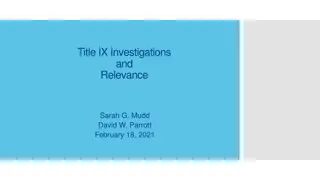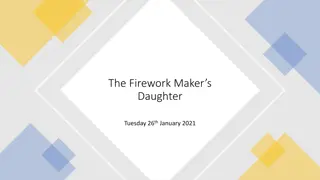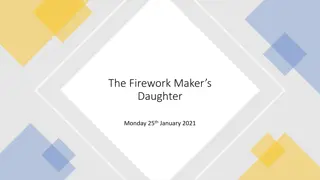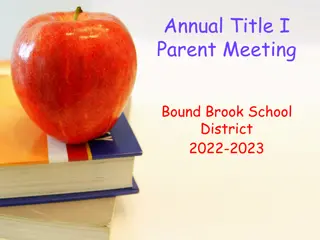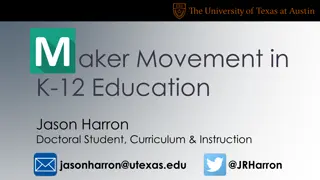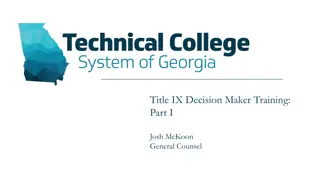Title IX Decision Maker Training Overview
This training covers the essential aspects of serving as a Title IX decision maker, emphasizing impartiality, avoiding bias, and managing conflicts of interest. It outlines the responsibilities, rules, and guidelines to ensure fair and objective handling of Title IX grievance procedures in educational settings.
Download Presentation

Please find below an Image/Link to download the presentation.
The content on the website is provided AS IS for your information and personal use only. It may not be sold, licensed, or shared on other websites without obtaining consent from the author. Download presentation by click this link. If you encounter any issues during the download, it is possible that the publisher has removed the file from their server.
E N D
Presentation Transcript
Title IX Decision Maker Specific Training REQUIRED TRAINING https://www.missouristate.edu/Policy/Op1-02-11-title-ix-sexual-harassment- grievance-procedure.htm Spring 2022
Overview Review how to serve impartially Issues of relevance Technology to be used in the Live Hearing 2
Serving Impartially FINAL RULE 106.45(B)(1)(III) Do not rely on sex stereotypes when approaching allegations, witnesses, complainants, respondents, or Formal Complaints. Investigations and adjudications under the Grievance Procedures must be impartial. Act objectively throughout your role in the process Avoid generalizing individuals based on prior prejudices involving sex, sex stereotypes, or status in the process 3
Bias What is Bias? 85 FR 30238-40 The Department of Education has defined bias as occurring in the following situations: Treating a party differently on the basis of the party s sex or stereotypes about how men or women behave with respect to sexual violence. Ignoring, blaming, or punishing a student due to stereotype about the student. 4
Bias What is Bias? Impermissible bias is fundamentally about making a decision based on the characteristics of the parties, instead of the available facts. 5
Bias What is not Bias? 85 FR 30252, 85 FR 30372, AND 85 FR 30252 The Department of Education has indicated three areas that are NOT defined as bias: 1. Outcomes of the Grievance Process 2. Title IX Coordinator Signs Formal Complaint 3. Professional Experience or Affiliation 6
Bias in Investigative Reports Title IX Investigators should refrain from making credibility determinations in Investigative Reports. Purpose of the investigative report is to summarize relevant evidence Decision Makers make credibility determinations 7
Conflict of Interest Individuals serving as Title IX Coordinator, Title IX Investigator and Decision Makers must not have a conflict of interest or bias: For or against complainants or respondents generally; or For or against an individual Complainant or Respondent. 8
NOT a Conflict of Interest 85 FR 30252-53, 30491-92 The University may fill Title IX personnel positions, including Decision Makers, with its own employees. The University may have different individuals from the same office serve separate Title IX roles. 9
Avoid Prejudgment of the Facts at Issue Title IX Coordinator, Title IX Investigator and any Decision Makers cannot: Pass judgment on the allegations presented by either party or witnesses; or Jump to any conclusions without a full investigation / review of the relevant facts from all parties involved. 10
Avoid Prejudgment of the Facts at Issue It would not be avoiding prejudgment of the facts at issue if: A Complainant reports allegations of sexual harassment to a Title IX Coordinator. After the Coordinator hears the Complainant s allegations, the Coordinator presumptively decides the allegations are false and the Complainant is uncredible. From solely the Complainant s reports, the Title IX Coordinator also forms a preconceived notion that the Respondent will be credible. 11
Avoid Prejudgment of the Facts at Issue It would not be avoiding prejudgment of the facts at issue if: The Title IX Investigator meets with both parties, and after the initial interviews, the Investigator concludes that the Respondent is believable, and the Complainant is not. The Investigator relies on a gut-feeling about the situation and it reminds him of a prior case where a Respondent was found not-responsible. Based on this alone, he decides there is no need to conduct further fact-finding or interview any additional witnesses identified by the parties. 12
Avoid Prejudgment of the Facts at Issue 85 FR 30254 Necessitates a broad prohibition of sex stereotypes Decisions must be based on individualized facts, and not on stereotypical notions of what men and women , Complainants and Respondents do or not do. 13
Best Practices to Avoid Prejudgment of the Facts at Issue 85 FR 30254 Any and all stereotypes about men and women must be left behind (whether from past Title IX proceedings or personal experiences). Approach each allegations with neutrality at the outset. Treat both parties equally and provide an equal opportunity to present evidence, witnesses, and their versions of events. 14
Avoiding Bias Determination of Credibility OP1-02-11 (9.3) Any determination of credibility made by the Decision Maker cannot be based solely on an individual s status as a: Complainant; Respondent; or Witness 15
Relevance The Title IX Investigator is tasked with obtaining relevant evidence. For purposes of the Title IX Grievance Policy, and as discussed in subsequent trainings, relevant evidence is evidence that is probative to the resolution of allegations included in the Formal Complaint. 16
Irrelevant Evidence OP1-02-11 (9.4.1-2) Questions (and evidence) about the Complainant s sexual predisposition and/or prior sexual behavior is considered irrelevant evidence unless the Decision Maker determines that: Questions/evidence is offered to prove that someone other than the Respondent committed the conduct alleged in the Formal Complaint; or Questions/evidence concern specific incidents of the Complainant s prior sexual behavior with respect to the Respondent and are offered to prove consent. 17
Technology Used in Live Hearing The University will utilize the Zoom Meeting Platform for all Virtual Live Hearings conducted pursuant to this Process. The Title IX Coordinator is responsible for facilitating the Live Hearing, including virtual Live Hearings. 18
Zoom Basics https://missouristate.teamdynamix.com/TDClient/1931/Portal/KB/A rticleDet?ID=100951 19
Zoom Basics Decision Makers should have a general understanding of Zoom prior to any Live Hearing. Decision Makers should ensure that their University Zoom account is equipped with the following settings: 20
Zoom Settings Always display participants names on their video Advanced Setting (Profile screen) Enable personal meeting ID Prevent participants from saving private chat Allow participants to have private chat Designate host only to screen share Enable Breakout Rooms Enable Waiting Rooms 21
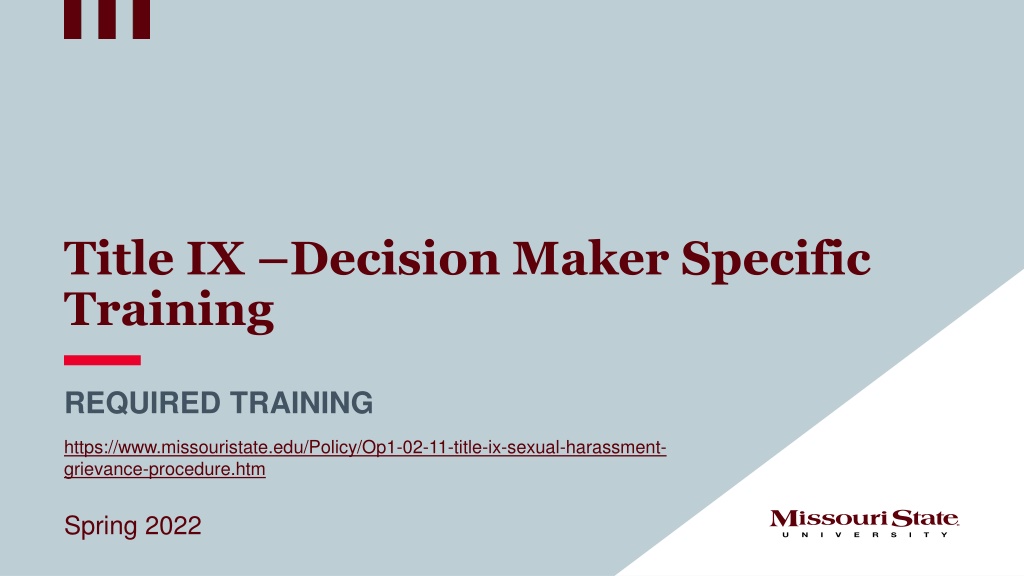
 undefined
undefined











